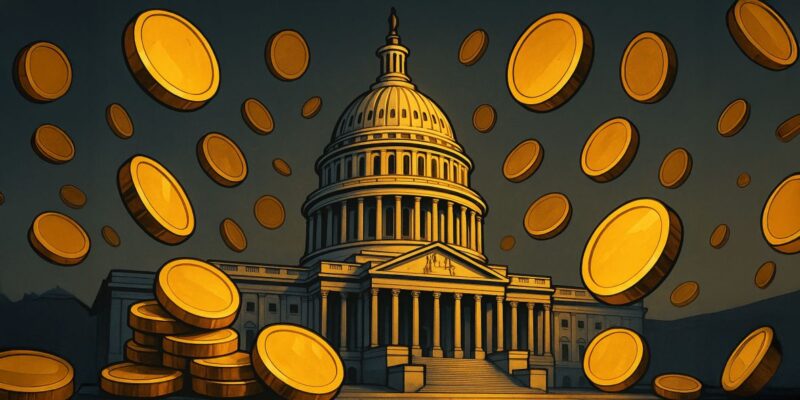
Key Notes:
- Split Oversight: The bill gives CFTC spot market authority and keeps SEC fraud oversight.
- New Rules: The bill requires exchanges, brokers, and developers to register and disclose key info.
- DeFi & Custody Support: The paper exempts core DeFi functions and allows secure crypto custody.
- Pro-Innovation Agenda: Republicans aim to boost U.S. crypto leadership and reduce regulatory uncertainty.
House Republicans have proposed a comprehensive bill to create clear rules for the U.S. digital asset industry.
The bill is being led by Republicans on the House Financial Services and Agriculture Committees, who argue that current law lacks clarity on how non-security digital assets should be regulated, leaving developers and investors in legal limbo.
“The Digital Asset Market Structure” (DAMS) Discussion Draft also proposes dividing crypto regulatory authority between the SEC and CFTC. This aims to close a perceived “spot market gap.”
What the (DAMS) Bill Proposes:
Establishing Clear Definitions and Oversight Roles
The bill defines key digital asset terms across the Securities Act of 1933, Exchange Act of 1934, and Commodity Exchange Act, laying the groundwork for consistent treatment. It gives the CFTC authority over digital commodity spot markets and permits the SEC to retain fraud oversight in markets it doesn’t fully regulate.
Requiring Market Participants to Register
New registration regimes would apply to:
- Digital commodity exchanges, brokers, and dealers under CFTC rules.
- SEC-registered entities dealing with stablecoins and associated digital commodities.
Protecting Consumers Through Developer Disclosures
To address fraud and user risk, the bill mandates:
- Detailed disclosures by digital asset developers about the asset’s structure, governance, and economics.
- A new “mature blockchain” certification process that distinguishes early-stage networks from established ones.
- Limits on insider sales.
Supporting Innovation Without Compromising Compliance
The bill carves out regulatory exemptions for certain decentralized finance (DeFi) activities, including:
- Validating transactions
- Publishing or updating blockchain software
- Providing user interfaces and wallets
It also recognizes blockchain custody practices, allowing institutions to hold customer digital assets without being penalized on their balance sheets—so long as operational risks are controlled.
Post-Election Agenda: Washington Eyes Global Tech Supremacy
The one-pager accompanying the draft presents the legislation as part of President Donald Trump’s vision to position the U.S. as the “crypto capital of the world, while aiming to reverse the enforcement-heavy approach taken under the Biden administration, particularly by SEC Chair Gary Gensler.
By proposing a “lasting framework” designed to “protect users while fostering technological growth”, the bill reinforces a broader push for innovation-friendly regulation in the post-election policy landscape.
Market and Investor Impact: What This Means Going Forward
For investors, the proposed legislation aims to provide greater transparency, legal clarity, and stronger safeguards, as regulated platforms would be required to segregate client funds, clearly disclose asset-related risks, and offer optional blockchain-based services, like staking, without imposing participation mandates.
For U.S.-based crypto firms, this could reopen pathways to innovation and fundraising without fear of regulatory retaliation.
The dual-agency structure also makes it easier for companies to determine which rules apply and how to comply, potentially attracting institutional investors previously deterred by ambiguity.
If enacted, the bill could stabilize crypto markets, reduce volatility caused by enforcement uncertainty, and bring venture capital back to U.S. projects that had shifted offshore.


